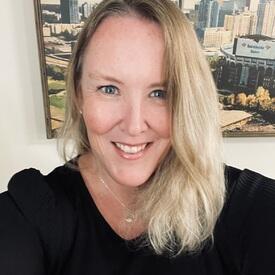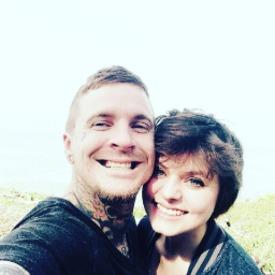Need to lose at least 50 pounds
Options

TimmyFangs
Posts: 2 Member
I need to lose 50 pounds to not be considered obese.
Honestly, with so much misinformation and contradicting information out there, it's hard to know what the real science is and where to begin. I don't want to die young. I'm only 37. I'm not ready to go yet.
Can anybody discuss here and help me figure out where to even start?
Honestly, with so much misinformation and contradicting information out there, it's hard to know what the real science is and where to begin. I don't want to die young. I'm only 37. I'm not ready to go yet.
Can anybody discuss here and help me figure out where to even start?
0
Replies
-
Calorie deficit.
Plug in all your stats, see what number MFP gives you (for example right now I'm at 2070cal before exercise calories), eat under that number at about 400-600 cals without going below the bare minimum (1200 for women, 1500 for men). Log EVERYTHING accurately. Double check entries to make sure they line up with what you're eating, a food scale will help since a lot of entries are in grams. Drink lots of water. Focus on balanced meals as opposed to 'healthy'. Treat yourself if you like, and remember one day isn't going to ruin the whole effort. If you go over, do better the next day.3 -
You need a calorie deficit. There are many ways to get there - but that is one aspect of the journey that cannot, will not change.
1 -
Get there mentally and decide you are ready to do this....sounds like you're ready to commit!
Calorie deficit
Log, log, log accurately
Get good sleep
Drink plenty of water
Serious exercise for me
I am not doing any pills, low carb, surgery, cleanse or anything so I can't speak to those but I am doing quite well at 100lbs down. Friend me if you'd like, I will help with support.3 -
Buy a kitchen scale like the ones at Walmart or Target for 24 dollars so that you can weigh your food and log accurately
0 -
Step 1: Buy a food scale
Step 2: Track everything to eat, weighing and logging it before you eat it. Track everything that you put in your mouth, including drinks, snacks, condiments.
Step 3: Do this for 3 weeks. Average how many calories you consumed, then cut back. For example, if you are averaging 3,000 calories a day, start doing 2,500-2,700. If you do great all week then do 4,000+ on the weekends, cut back on weekends.0 -
I had no clue either how to start lol to be honest at times i am still confused haha. Just start off small like add less sugar or cream in your coffee for example. Park father away from the grocery store so you have to walk further. Watch less Tv and listen to more music and you cN just stand up and do some dancing. Walk. And then walk more and more. Challenge yourself but don't challenge yourself to hard. Eat healthier and drink more water. You'll start seeing results then your get more addicted to it and youll fibe what you enjoy doing for excercise. I loved walking but it wasnt to much for me so I started jogging and slowly with consistency and patiences I was able to push myself farther and lost 46 lbs in 9 months1
-
As far as the science goes, the best diet is the one that reduces your calories below what you use, and that you can stick to for the rest of your life. Calorie counting, exercise, and regular weighing are all habits of people who successfully lose weight and keep it off, but remember that exercise is most important for maintenance, not weight loss. Right now maybe focus on diet, but make slowly building an exercise routine a priority so that habit is in place when you've lost what you want to lose.
In terms of finding a diet that works for you, extreme deprivation works short term but rarely long term - if you try and cut all of a food group (or single food even) that you love to eat, it ends up on a pedestal and you're likely to overindulge eventually. If you try to drastically cut calories all at once you will likely be hungry and miserable. Start by tracking your current diet and learning how much you need to eat to maintain your current weight, then start making gradual changes to decrease your calorie intake. Learn what foods fill you up and what foods lead to binges.
As you lose weight, you will have to continue to adjust your calorie intake downward to adjust to the smaller energy needs of your body. Remember that weight loss is not linear - some days the scale will go up, sometimes it will go down, but if you are accurately counting calories and keeping at a deficit, it will go down. If your weight loss stalls, you are almost certainly eating more than you're using, and may need to tighten up your calorie tracking. There are no jump starts or cleanses or secrets. And remember that losing a pound or two a month is still a victory. Maintaining is a victory. Just be patient and keep at it.
And good luck!2 -
Stop posting about how you want to do it and just do it. Mentally commit and get it done. You'll get great advice on this board but ultimately you're the one that has to take action.1
-
"[see what number MFP gives you (for example right now I'm at 2070cal before exercise calories), eat under that number at about 400-600 cals without going below the bare minimum (1200 for women, 1500 for men)."
@MichelleSilverleaf
I'm sorry for the weird quoting, I'm on the app and it doesn't let me quote correctly.
The number MFP gives you for a calorie goal already puts you in a deficit. If she were to be eating 400-600 less than the goal she would not be nourishing her body correctly which can be very dangerous!
At the beginning I was eating at 1200 calories, I'm 5'3" 165.2 lbs, 20 years old. I started feeling very sick because I realized I'm not sedentary, and I need more. Now I'm eating 1360 calories and feeling better.
I have lost 18lbs, at a little more than a pound a week, and I'm feeling good.
Get a food scale and measure the food you're putting in your body!
If you're accurately logging you'll lose the weight.
0 -
TimmyFangs wrote: »I need to lose 50 pounds to not be considered obese.
Honestly, with so much misinformation and contradicting information out there, it's hard to know what the real science is and where to begin. I don't want to die young. I'm only 37. I'm not ready to go yet.
Can anybody discuss here and help me figure out where to even start?
With 50 pounds to lose, select a weekly weight loss goal of a pound a week when you plug your stats into MFP. Many people make the mistake of trying to lose too much too fast, which is often not sustainable.
Find out what foods fill you up the most and focus on them.
Understanding satiety: feeling full after a meal
...Tips on how to feel fuller
So how can we best try to enhance these feelings of fullness to help us control how much we eat? Here are some top tips for helping you feel fuller:- Foods high in protein seem to make us feel fuller than foods high in fat or carbohydrate, so including some protein at every meal should help keep you satisfied. Foods high in protein include meats such as chicken, ham or beef, fish, eggs, beans and pulses.
- If you are watching your weight, opt for lower fat versions, using leaner cuts of meat, cutting off visible fat and avoiding the skin on poultry as this will help reduce the energy density of the diet, which can help to enhance satiety (see below).
- Foods that are high in fibre may also enhance feelings of fullness so try to include plenty of high-fibre foods in the diet such as wholegrain bread and cereals, beans and pulses and fruit and vegetables.
- Alcohol seems to stimulate appetite in the short-term and therefore drinking alcohol is likely to encourage us to eat more. Alcoholic beverages can make you forget about your intentions to eat healthily by making you lose your inhibitions. Alcoholic drinks are also calorific, so you should cut down on alcohol consumption if you are trying to control your weight.
- The ‘energy density’ of food has a strong influence on feelings of fullness or satiety. Energy density is the amount of energy (or calories) per gram of food. Lower energy density foods provide less energy per gram of food so you can eat more of them without consuming too many calories. Low energy density foods include fruit and vegetables, foods with lots of water added when cooking such as soups and stews, and lower fat foods. Click here for more information on energy density.
Read more: http://www.nutrition.org.uk/healthyliving/fuller/understanding-satiety-feeling-full-after-a-meal.html2
Categories
- All Categories
- 1.4M Health, Wellness and Goals
- 392K Introduce Yourself
- 43.6K Getting Started
- 259.8K Health and Weight Loss
- 175.7K Food and Nutrition
- 47.4K Recipes
- 232.3K Fitness and Exercise
- 402 Sleep, Mindfulness and Overall Wellness
- 6.4K Goal: Maintaining Weight
- 8.5K Goal: Gaining Weight and Body Building
- 152.8K Motivation and Support
- 7.9K Challenges
- 1.3K Debate Club
- 96.3K Chit-Chat
- 2.5K Fun and Games
- 3.4K MyFitnessPal Information
- 23 News and Announcements
- 998 Feature Suggestions and Ideas
- 2.4K MyFitnessPal Tech Support Questions









